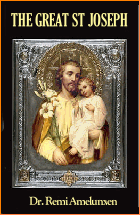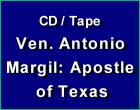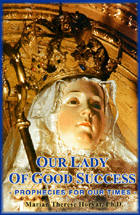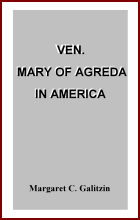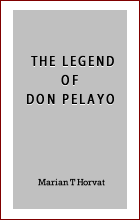American History
 |
 |
 |
 |
 |
 |
 |
Fundamental Errors of the Founding Fathers - 2
Jefferson’s Hatred for the Catholic Church
In my last article, I demonstrated how the beliefs of Thomas Jefferson were founded on Bacon, Newton, Locke and Epicurus. In this article, I hope to expose his malice towards the True Faith and show just how opposed his views of government are to the Catholic view on this matter.
Thomas Jefferson made no attempt to hide his hatred for the Holy Catholic Church, which he deemed to be the enemy of any free man. Pretending to admire the teachings of Our Lord, he interpreted them to suit his own selfish ideals and worldly interests.
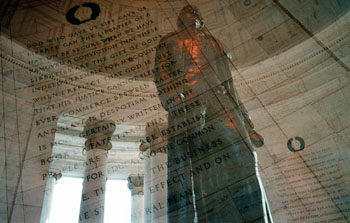 His false respect for the person of Christ is shown in his blasphemous scorn of Christ’s Divinity, which can be verified in the quotes that follow.
His false respect for the person of Christ is shown in his blasphemous scorn of Christ’s Divinity, which can be verified in the quotes that follow.
In a letter addressed to John Adams on January 24, 1814, Jefferson states that "the whole history of these books [the Gospels] is so defective and doubtful that it seems vain to attempt minute enquiry into it: and such tricks have been played with their text, and with the texts of other books relating to them, that we have a right, from that cause, to entertain much doubt what parts of them are genuine.
"In the New Testament there is internal evidence that parts of it have proceeded from an extraordinary man; and that other parts are of the fabric of very inferior minds. It is as easy to separate those parts, as to pick out diamonds from dunghills." (1)
 In another later letter to John Adams on April 11, 1823, Jefferson specifies what he means by “defective and doubtful” history:
In another later letter to John Adams on April 11, 1823, Jefferson specifies what he means by “defective and doubtful” history:
"And the day will come when the mystical generation of Jesus, by the supreme being as his father in the womb of a virgin, will be classed with the fable of the generation of Minerva in the brain of Jupiter.
"But may we hope that the dawn of reason and freedom of thought in these United States will do away with this artificial scaffolding, and restore to us the primitive and genuine doctrines of this most venerated reformer of human errors." (2)
In another of his writings, he compares the Holy Trinity to the monstrous Ceberus: "The hocus-pocus phantasm of a God, like another Cerberus, with one body and three heads, had its birth and growth in the blood of thousands and thousands of martyrs." (3)
The god & bible of Jefferson
If Thomas Jefferson so scorns the True God, who could he possibly mean by “the Creator” and “Nature’s God,” to which he refers in the Declaration?
Indeed, the god to which he refers is not the Catholic God, for he speaks of the God of the New Testament and the God of the Old as if they are two different beings: one evil and the other good.
Deciding for himself what was true or false in Holy Scriptures, he used his razor to cut out passages and whole pages from the Bible and wrote The Life and Morals of Jesus of Nazareth. Essentially it is "Jefferson’s Bible," as it came to be called: a bible without miracles or the Resurrection and without the entire Old Testament.
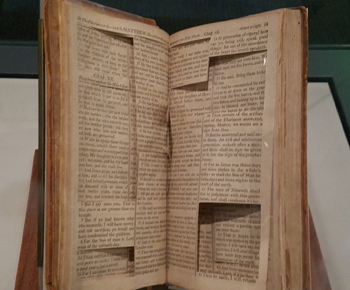 On August 4, 1820, Jefferson wrote a letter to William Short in which he scorns Moses and the "empty rituals of the Old Testament," rituals that prefigured the rules and rites of the Catholic Church:
On August 4, 1820, Jefferson wrote a letter to William Short in which he scorns Moses and the "empty rituals of the Old Testament," rituals that prefigured the rules and rites of the Catholic Church:
"[Jesus’] object was the reformation of some articles in the religion of the Jews, as taught by Moses. That sect had presented for the object of their worship a being of terrific character, cruel, vindictive, capricious and unjust. ...
"Moses had bound the Jews to many idle ceremonies, mummeries and observances of no effect towards producing the social utilities which constitute the essence of virtue. Jesus exposed their futility and insignificance. The one [i.e., Moses] instilled into his people the most anti-social spirit towards other nations; the other [Jesus] preached philanthropy and universal charity and benevolence.
"The office of reformer of the superstitions of a nation is ever dangerous. Jesus had to walk on the perilous confines of reason and religion: and a step to right or left might place him within the grip of the priests of the superstition, a bloodthirsty race, as cruel and remorseless as the being whom they represented as the family God of Abraham, of Isaac and of Jacob, and the local God of Israel." (4)
In his writing of April 21, 1803, Doctrines of Jesus Compared with Others, Jefferson spoke thus about Our Lord: "According to the ordinary fate of those who attempt to enlighten and reform mankind, [Jesus] fell an early victim to the jealousy and combination of the altar and the throne." (5)
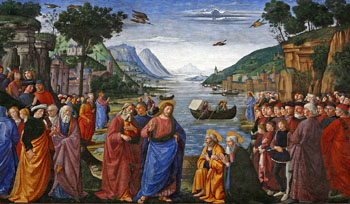 As can be determined from the above quotes, Jefferson considered Our Lord to be no more than a reformer who had extraordinary natural qualities and taught a good moral doctrine that was distorted by His followers. In his mind, Our Lord would simply be a precursor to the Enlightenment thinkers, like Jefferson, who would have perfected His ideas.
As can be determined from the above quotes, Jefferson considered Our Lord to be no more than a reformer who had extraordinary natural qualities and taught a good moral doctrine that was distorted by His followers. In his mind, Our Lord would simply be a precursor to the Enlightenment thinkers, like Jefferson, who would have perfected His ideas.
Additionally, Jefferson’s claim that Jesus was a "victim of the altar and the throne" shows his disdain for the established Church – the true Jewish Synagogue established by God in the Old Testament – and the secular authority that was hierarchical in nature – the Roman Empire.
In Christendom, the altar became the Holy Catholic Church and the throne became the Holy Roman German Empire. These two building blocks of Catholic Civilization were the object of Jefferson's most intense hatred. As a principle writer of the Founding documents, it is not surprising that Jefferson imbued this distaste for the altar and throne into every document and every principle that he set forth for the new nation.
Priests as the enemies of Liberty
Yet Jefferson’s hatred of the Church did not stop there. He directs more attacks against priests, who, in his view, undermine the rights of man. The priest, particularly the Catholic priest, was the enemy of his most-prized liberty.
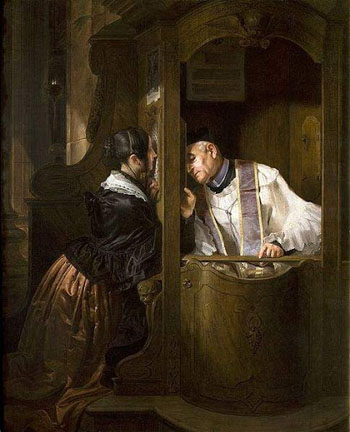 Writing to Dr. Benjamin Rush in a letter dated September 23, 1800, Jefferson stated:
Writing to Dr. Benjamin Rush in a letter dated September 23, 1800, Jefferson stated:
"The clergy ... believe that any portion of power confided to me [as President] will be exerted in opposition to their schemes. And they believe rightly: For I have sworn upon the altar of God eternal hostility against every form of tyranny over the mind of man.” (6)
Now what is this tyranny other than the claim of Truth, which the Catholic Church wields over men? For any claim to Truth that forbids “free-thought” Jefferson brands as tyranny. And upon which altar do we suppose Jefferson is swearing? Certainly it is not a Catholic altar.
Jefferson further indicates his disdain for priests and those who follow them in a letter to Alexander von Humboldt on December 6, 1813:
"That they [Mexicans] will throw off their European dependence I have no doubt; but in what kind of government their revolution will end I am not so certain. History, I believe, furnishes no example of a priest-ridden people maintaining a free civil government. This marks the lowest grade of ignorance, of which their civil as well as religious leaders will always avail themselves for their own purposes." (7)
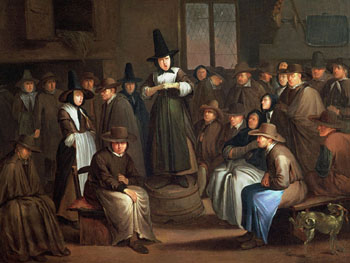 Again, in a letter to Horatio G. Spafford on March 17, 1814, Jefferson claims: "In every country and in every age, the priest has been hostile to liberty." (8)
Again, in a letter to Horatio G. Spafford on March 17, 1814, Jefferson claims: "In every country and in every age, the priest has been hostile to liberty." (8)
Addressing William Short on April 13, 1820, Jefferson bemoans the fact that mankind will never improve with the existence of priests: "The serious enemies are the priests of the different religious sects, to whose spells on the human mind its improvement is ominous.” (9)
Finally, Jefferson writes to John Adams in 1813: "We should all then, like the Quakers, live without an order of priests, moralize for ourselves, follow the oracle of conscience, and say nothing about what no man can understand, nor therefore believe; for I suppose belief to be the assent of the mind to an intelligible proposition." (10)
A liberal society can only exist without the Catholic Church
The ideal government and American society that Jefferson had in mind was a society devoid of priests: An individualistic society where each man would decide for himself what is right or wrong.
How can a nation founded on such principles be said to be founded on Christian principles? The very principles and prerequisites for Jeffeson's liberty demand a people who are not obedient to Church doctrine and follow their own ideas instead. On the other hand, a Catholic nation would be opposed to the revolutionary liberty of conscience, because, with the teaching of the Church, all people would obey the Catholic Faith rather than their own consciences .
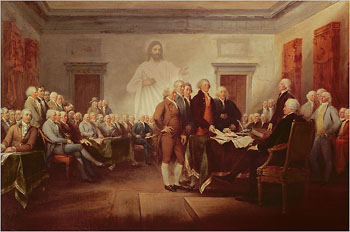 We can be assured of Jefferson’s stance in his final testimony in the last letter he penned, written to Roger C. Weightman on June 24, 1826:
We can be assured of Jefferson’s stance in his final testimony in the last letter he penned, written to Roger C. Weightman on June 24, 1826:
"May it be to the world, what I believe it will be (to some parts sooner, to others later, but finally to all) the signal of arousing men to burst the chains under which monkish ignorance and superstition had persuaded them to bind themselves, and to assume the blessings and security of self-government.
"All eyes are opened, or opening, to the rights of man. The general spread of the light of science has already laid open to every view the palpable truth, that the mass of mankind has not been born with saddles on their backs, nor a favored few booted and spurred, ready to ride them legitimately, by the grace of God." (11)
Need we further proof that Jefferson was not a friend of Catholics? It is not possible to claim that the Declaration was founded on Christian principles if the man who wrote it was so opposed to true liberty – the liberty of the Catholic who obeys his Holy Mother the Church in all things.
Continued

Thomas Jefferson made no attempt to hide his hatred for the Holy Catholic Church, which he deemed to be the enemy of any free man. Pretending to admire the teachings of Our Lord, he interpreted them to suit his own selfish ideals and worldly interests.

Jefferson held up as an American idol
In a letter addressed to John Adams on January 24, 1814, Jefferson states that "the whole history of these books [the Gospels] is so defective and doubtful that it seems vain to attempt minute enquiry into it: and such tricks have been played with their text, and with the texts of other books relating to them, that we have a right, from that cause, to entertain much doubt what parts of them are genuine.
"In the New Testament there is internal evidence that parts of it have proceeded from an extraordinary man; and that other parts are of the fabric of very inferior minds. It is as easy to separate those parts, as to pick out diamonds from dunghills." (1)

Jefferson compares God to
the three headed monster Cerberus
"And the day will come when the mystical generation of Jesus, by the supreme being as his father in the womb of a virgin, will be classed with the fable of the generation of Minerva in the brain of Jupiter.
"But may we hope that the dawn of reason and freedom of thought in these United States will do away with this artificial scaffolding, and restore to us the primitive and genuine doctrines of this most venerated reformer of human errors." (2)
In another of his writings, he compares the Holy Trinity to the monstrous Ceberus: "The hocus-pocus phantasm of a God, like another Cerberus, with one body and three heads, had its birth and growth in the blood of thousands and thousands of martyrs." (3)
The god & bible of Jefferson
If Thomas Jefferson so scorns the True God, who could he possibly mean by “the Creator” and “Nature’s God,” to which he refers in the Declaration?
Indeed, the god to which he refers is not the Catholic God, for he speaks of the God of the New Testament and the God of the Old as if they are two different beings: one evil and the other good.
Deciding for himself what was true or false in Holy Scriptures, he used his razor to cut out passages and whole pages from the Bible and wrote The Life and Morals of Jesus of Nazareth. Essentially it is "Jefferson’s Bible," as it came to be called: a bible without miracles or the Resurrection and without the entire Old Testament.

Jefferson 'rewrote' the Bible excluding the divinity of Jesus Christ
"[Jesus’] object was the reformation of some articles in the religion of the Jews, as taught by Moses. That sect had presented for the object of their worship a being of terrific character, cruel, vindictive, capricious and unjust. ...
"Moses had bound the Jews to many idle ceremonies, mummeries and observances of no effect towards producing the social utilities which constitute the essence of virtue. Jesus exposed their futility and insignificance. The one [i.e., Moses] instilled into his people the most anti-social spirit towards other nations; the other [Jesus] preached philanthropy and universal charity and benevolence.
"The office of reformer of the superstitions of a nation is ever dangerous. Jesus had to walk on the perilous confines of reason and religion: and a step to right or left might place him within the grip of the priests of the superstition, a bloodthirsty race, as cruel and remorseless as the being whom they represented as the family God of Abraham, of Isaac and of Jacob, and the local God of Israel." (4)
In his writing of April 21, 1803, Doctrines of Jesus Compared with Others, Jefferson spoke thus about Our Lord: "According to the ordinary fate of those who attempt to enlighten and reform mankind, [Jesus] fell an early victim to the jealousy and combination of the altar and the throne." (5)

For Jefferson Jesus was just an exceptional man who reformed a bad religion
Additionally, Jefferson’s claim that Jesus was a "victim of the altar and the throne" shows his disdain for the established Church – the true Jewish Synagogue established by God in the Old Testament – and the secular authority that was hierarchical in nature – the Roman Empire.
In Christendom, the altar became the Holy Catholic Church and the throne became the Holy Roman German Empire. These two building blocks of Catholic Civilization were the object of Jefferson's most intense hatred. As a principle writer of the Founding documents, it is not surprising that Jefferson imbued this distaste for the altar and throne into every document and every principle that he set forth for the new nation.
Priests as the enemies of Liberty
Yet Jefferson’s hatred of the Church did not stop there. He directs more attacks against priests, who, in his view, undermine the rights of man. The priest, particularly the Catholic priest, was the enemy of his most-prized liberty.

Jefferson scorns the power of the priest
"The clergy ... believe that any portion of power confided to me [as President] will be exerted in opposition to their schemes. And they believe rightly: For I have sworn upon the altar of God eternal hostility against every form of tyranny over the mind of man.” (6)
Now what is this tyranny other than the claim of Truth, which the Catholic Church wields over men? For any claim to Truth that forbids “free-thought” Jefferson brands as tyranny. And upon which altar do we suppose Jefferson is swearing? Certainly it is not a Catholic altar.
Jefferson further indicates his disdain for priests and those who follow them in a letter to Alexander von Humboldt on December 6, 1813:
"That they [Mexicans] will throw off their European dependence I have no doubt; but in what kind of government their revolution will end I am not so certain. History, I believe, furnishes no example of a priest-ridden people maintaining a free civil government. This marks the lowest grade of ignorance, of which their civil as well as religious leaders will always avail themselves for their own purposes." (7)

Jefferson proposes we all live like Quakers
following ‘the oracle of conscience’
Addressing William Short on April 13, 1820, Jefferson bemoans the fact that mankind will never improve with the existence of priests: "The serious enemies are the priests of the different religious sects, to whose spells on the human mind its improvement is ominous.” (9)
Finally, Jefferson writes to John Adams in 1813: "We should all then, like the Quakers, live without an order of priests, moralize for ourselves, follow the oracle of conscience, and say nothing about what no man can understand, nor therefore believe; for I suppose belief to be the assent of the mind to an intelligible proposition." (10)
A liberal society can only exist without the Catholic Church
The ideal government and American society that Jefferson had in mind was a society devoid of priests: An individualistic society where each man would decide for himself what is right or wrong.
How can a nation founded on such principles be said to be founded on Christian principles? The very principles and prerequisites for Jeffeson's liberty demand a people who are not obedient to Church doctrine and follow their own ideas instead. On the other hand, a Catholic nation would be opposed to the revolutionary liberty of conscience, because, with the teaching of the Church, all people would obey the Catholic Faith rather than their own consciences .

A ridiculuous depiction of Jesus Christ ‘inspiring’ the Declaration
"May it be to the world, what I believe it will be (to some parts sooner, to others later, but finally to all) the signal of arousing men to burst the chains under which monkish ignorance and superstition had persuaded them to bind themselves, and to assume the blessings and security of self-government.
"All eyes are opened, or opening, to the rights of man. The general spread of the light of science has already laid open to every view the palpable truth, that the mass of mankind has not been born with saddles on their backs, nor a favored few booted and spurred, ready to ride them legitimately, by the grace of God." (11)
Need we further proof that Jefferson was not a friend of Catholics? It is not possible to claim that the Declaration was founded on Christian principles if the man who wrote it was so opposed to true liberty – the liberty of the Catholic who obeys his Holy Mother the Church in all things.
Continued
- See here https://founders.archives.gov/documents/Jefferson/03-07-02-0083
- See here https://founders.archives.gov/documents/Jefferson/98-01-02-3446
- Thomas Jefferson, Works, Vol. IV, p. 360.
- See here https://founders.archives.gov/documents/Jefferson/98-01-02-1438
- See here https://founders.archives.gov/documents/Jefferson/01-40-02-0178-0002
- See here https://founders.archives.gov/documents/Jefferson/01-32-02-0102
- See here https://founders.archives.gov/documents/Jefferson/03-07-02-0011
- See herhttps://founders.archives.gov/documents/Jefferson/03-07-02-0167
- See herhttps://founders.archives.gov/documents/Jefferson/98-01-02-1218
- See herhttps://founders.archives.gov/documents/Jefferson/03-06-02-0446
- See here https://www.loc.gov/exhibits/declara/rcwltr.html

Posted February 19, 2021
______________________
______________________



